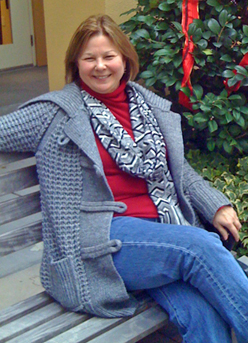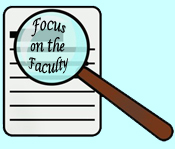Department of Teacher Education


Professor Julie Swanson has a goal. And she'll do whatever it takes to make sure that goal is reached. "When you work for 25, 30 years to accomplish certain goals, you try to maintain that work," she says. "It takes so long to make any kind of a difference, but that's what a lot of us do."
Swanson teaches in the college's Department of Teacher Education, where her specialty is teaching others how to better identify and understand how to meet the educational needs of gifted children. Her courses include "Nature and Needs of Gifted Learners" and "Introduction to Curriculum for Gifted Learners," as well as some advanced courses like "Program Planning for Gifted Students" and "Social and Emotional Development of Gifted Learners."
Swanson's teaching skills have helped to prepare a whole new generation of teachers for gifted students. Her former students speak very highly of her, and many give her credit for their understanding of gifted children. Analyn Haynes, a former Swanson student, describes her as "Wonderful, intelligent, professional, and very passionate about her classes and students."
Haynes continues with her praise of the professor, adding, "As a teacher of gifted students, I learned how to work and meet the social, emotional, and academic levels of my students through the courses I have taken with her."
With her busy teaching schedule, it's hard to believe that she can find the time for independent research, but she does. "When you're a professor you have the luxury of not having set hours," Swanson says. "When you're not at a nine-to-five job you have more flexibility about when and how you do your work."
Swanson says being a professor and having to balance your schedule is a lot like being a student and having to balance your schedule. "You have these times of peak activity and then you have times when it's not so busy," she says. "And then you know there are certain times, like at the end of the semester, when you're going to have everything on top of you. With us, it's the same way."
Whether she's busy in her downtown office or teaching at the North Charleston campus, Swanson always has time for what has been her passion since her early 20s: gifted children.
Swanson first became interested in gifted children when she was an elementary school teacher. She says there weren't programs in South Carolina at the time for gifted kids, so when someone from the school district came to Swanson with an interest in developing some special activities for really bright kids, she started working as a volunteer while her regular 3rd graders went to music class. Swanson says as she realized how much she enjoyed it, she started doing more during her planning periods. She soon became a teacher for gifted children, then she became a coordinator for gifted programming.
"You could see that those kids weren't getting what they needed in their regular classroom because they would just kind of be put in a corner to work on their own," she says, "It was just a lot of fun to work with them because they just have a lot of energy and intellectual curiosity, and at that age, they also have a lot of motivation."
Once Swanson realized how much this kind of work called to her, she began to expand her boundaries and do more research as opposed to teaching. In 1998, she received a large federal Jacob Javits Gifted and Talented Education Grant. With this funding, she dedicated her time to working with high poverty schools to identify gifted children.
After becoming a tenured member of the CofC faculty, Swanson continued to both research and teach. Some of the most interesting research Swanson says she has done is working with an eminent colleague from the College of William and Mary, Joyce VanTassel-Baska. Swanson says, "South Carolina had started trying a really innovative way to find gifted kids that were underrepresented, like high poverty kids, African American kids, Hispanic kids, but there are certain groups of kids that are hard to identify just because of their background."
Under VanTassel-Baska's leadership, Swanson and other researchers developed case studies about specific children, using interviews from the kids themselves, their parents, and their teachers, to help others recognize that there are many different kinds of gifted children that don't always appear the same.
This research was completed in 2006 while the children were still in middle school, and now Swanson and another colleague, Dr. Wayne Lord, are conducting a follow-up study to see what kinds of classes these students took in high school, if they are in a college, what kinds of grades they've received, and other pertinent information to help chart their progress.
Swanson is also doing a study at Charleston's Burke High School, where there is a program called "The APA Academy." The purpose of the academy is to lend support to the students while they are enrolled in rigorous courses, and to encourage them in taking challenging courses. The students with systemic obstacles are Swanson's main focus. "Those are the kids that I'm interested in," she says. "What do they do with opportunities, and how we can provide support to help them take advantage of the opportunities they're given."
In addition to her already impressive background, Swanson is a published author, having co-written a book with her colleague Dr. Finnan titled "Accelerating the Learning of All Students." She has made significant contributions to other publications, such as a book by Joyce VanTassel-Baska and articles in Gifted Child Quarterly and Journal for the Education of the Gifted.
Swanson says her biggest achievement to date was what she calls her "Sally Field" moment. "I felt like Sally Fields when she won the Academy Award and said 'You like me, you really like me!'" she says. "It was a huge surprise, receiving the Richard W. Riley award for significant impact on South Carolina's gifted children."
The award is presented by the South Carolina Consortium for Gifted Education to "recognize the efforts of individuals who have produced significant and substantial impact on gifted youngsters in South Carolina."
Even though South Carolina has come a long way in its programming for gifted students, Swanson's work is not quite finished. She's currently working on a certificate program in Gifted Education that will enable students to complete a more organized study in the field, a huge feat for CofC since Converse College in upstate South Carolina is the only other college in the state that offers such a program.
After making such contributions in her field of study, you might think that Julie Swanson is ready to slow down, or maybe even retire sometime soon. But that's not the case here.
Why not? "Well," she says, "There's just a lot more work to be done."
###